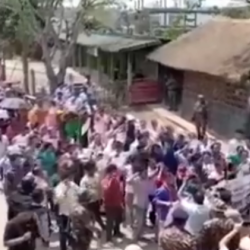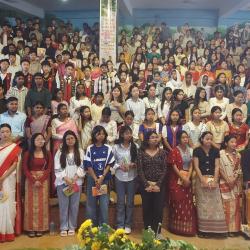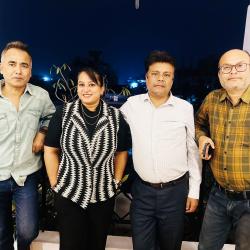The theme of this year's World Diabetes Day (14 November) is diabetes in children and adolescents. The global awareness campaign aims to bring the spot light on diabetes and highlight the message that no child should die of diabetes. It also aims to increase awareness in parents, caregivers, teachers, health care professionals, politicians and the common public regarding diabetes.
World Diabetes Day (www.worlddiabetesday.org) is observed every year on November 14, because this day marks the birthday of Frederick Banting, who was credited with discovering insulin some 87 years ago. This day was first introduced in 1991 by the International Diabetes Federation (IDF) and the World Health Organization (WHO), in response to the alarming rise in diabetes around the world. In 2007, the United Nations made the day an official UN world day after the passage of the United Nations World Diabetes Day Resolution in December 2006. The UN recognized that diabetes is increasing at an epidemic rate and is affecting people of all ages.
Diabetes is one of the most common chronic conditions to affect children. It can strike children of any age-- even toddlers and babies. If not detected early enough in a child, diabetes can be fatal or it may result in serious brain damage. Yet diabetes in a child is often completely overlooked: it is often misdiagnosed as the flu or is not diagnosed at all.
In both urban and rural areas, diabetes in children and adolescents often does not get diagnosed in time. The reasons for this are manifold-- lack of education / awareness of the symptoms of this condition, lack of proper care, girl child stigma and poverty.
"Early diagnosis of diabetes in children is very poor in rural areas and some of them die because of it, in the absence of timely diagnosis and /or treatment, which is pretty shameful for us. Therefore the government should strengthen its rural healthcare services for early diagnosis and proper treatment /care of diabetes in children and adolescents" said Professor Dr CS Yajnik, Director, Diabetes Unit, King Edward Memorial Hospital , Pune , India .
Every parent, school teacher, school nurse, doctor and others involved in the care of children should be familiar with the warning signs or symptoms of diabetes which could be any one or more of the following:-- frequent urination, excessive thirst, increased hunger, weight loss, tiredness, lack of concentration, blurred vision, vomiting and stomach pain. In children with Type-2 diabetes these symptoms may be mild or absent.
Type-1 diabetes is an auto-immune disease that cannot be prevented. Globally, it is the most common form of diabetes in children, affecting around 500,000 children under 15 years of age. Finland , Sweden and Norway have the highest incidence rates for Type-1 diabetes in children. However, as a result of increasing childhood obesity and sedentary lifestyles, Type-2 diabetes is also increasing at a very fast pace in children and adolescents. In some countries, like Japan , Type- 2 diabetes has become more common in children than Type-1.
Every day more than 200 children are diagnosed with Type-1 diabetes, requiring them to take multiple daily insulin shots and monitor the glucose levels in their blood. This type of diabetes is increasing yearly at the rate of 3% amongst children and is rising even faster in pre-school children at the rate of 5% per year. Diabetic Ketoacidosis (DKA), a build-up of excess acids in the body as a result of uncontrolled diabetes, is a major cause of death in children with Type-1 diabetes. DKA can be prevented with early diagnosis and proper medical care.
Life for children living with Type-1 diabetes, in the developing world, is bleak indeed. About 75,000 children in the low-income and lower-middle income countries are living with diabetes in desperate circumstances. These children need life-saving insulin to survive. Many are in need of monitoring equipment, test strips and proper guidance to manage their condition in order to avoid the life-threatening complications associated with diabetes. A child's access to appropriate medication and care should be a right and not a privilege.
"A comprehensive approach that addresses diabetes risk factors is needed. Researchers have found that societal influences on teenage boys and girls can affect their diabetes, and that in most cases girls suffer more from these influences," said Dr Sonia Kakkar, a Delhi based diabetes specialist.
Type- 2 diabetes affects children in both developed and developing countries and is becoming a global public health issue with potentially serious outcomes.
It has been reported in children as young as eight years and now exists even in those who were previously thought not to be at risk. In native and aboriginal communities in the United States , Canada and Australia at least 1 in every 100 youth has diabetes. In some communities, this ratio is 1 in every 25. Global studies have shown that Type- 2 diabetes can be prevented by enabling individuals to lose 7-10% of their body weight, and by increasing their physical activity to a modest level.
"The stark reality is that many children in developing countries die soon after diagnosis," said Dr Jean-Claude Mbanya, President-Elect of the International Diabetes Federation (IDF), in a press release issued by IDF. Dr Mbanya further said, "It has been 87 years since the discovery of insulin, yet many of the world's most vulnerable citizens, including many children, die needlessly because of lack of access to this essential drug. This is a global shame. We owe it to future generations to address this issue now."
According to the International Diabetes Federation, "In many developing countries, particularly in Sub-Saharan Africa and some parts of Asia , life-saving diabetes medication and monitoring equipment is often unavailable or unaffordable. As a result, many children with diabetes die soon after diagnosis, or have a quality of life, and they develop the devastating complications of the disease early."
In order to support some of these children, the IDF created its Life for a Child Program in 2001. The program, which is operated in partnership with Diabetes Australia-NSW and HOPE worldwide, currently supports a total of 1000 children in Azerbaijan, Bolivia, The Democratic Republic of Congo, Ecuador, Fiji, India, Mali, Nepal, Nigeria, Papua New Guinea, The Philippines, Rwanda, Sri Lanka, Sudan, The United Republic of Tanzania, Uzbekistan and Zimbabwe.
Although significant activities have been initiated in the past few years to improve health responses to diabetes, efforts are still inadequate, weak and fragmented. Progress is impeded by a public health system that places a higher priority on communicable diseases and maternal and child health services and by a private health system driven by curative medicine. However, a comprehensive health response to diabetes that addresses prevention, treatment, care and support needs for people with diabetes, needs more advocacy and partnership with different agencies that can bring in the desired changes in the life of every person living with diabetes.
IDF asks everyone around the world to help bring diabetes to light and to affect change to improve care for people living with diabetes. Find out more at www.worlddiabetesday.org
Amit Dwivedi
(The author is a Special Correspondent to Citizen News Service (CNS). Email: amit@citizen-news.org)








Comments
Pages
Add new comment